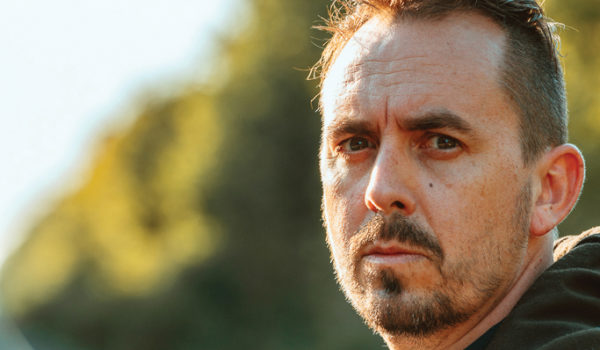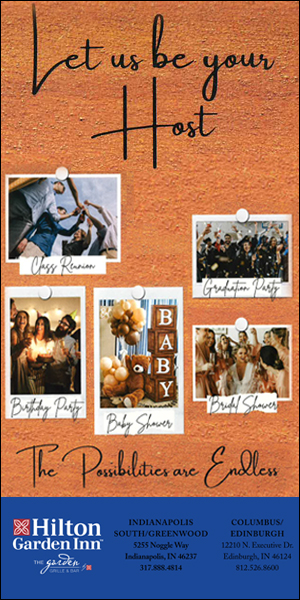
What do cooking and writing have in common? Chef and author Clint Smith says it’s all in the connection of creation. He has been creating poetry and short stories for years and publishing them since 2009. His first short story collection, “Ghouljaw and Other Stories,” came out in 2014, and his novella, “When It’s Time For Dead Things To Die,” came out in 2019. It’s not all horror for him, though; his freelance work has appeared in other local and regional publications, including South.
Smith currently lives with his family on the southside. When he’s not dreaming up tales of the grotesque and uncanny, he works as a culinary arts instructor at a high school in Johnson County and teaches adult cooking classes at the Massachusetts Avenue bed-and-breakfast, Nestle Inn.
Although Smith appreciates horror in all seasons, his short story collection, “The Skeleton Melodies,” was released in early August, just in time for Halloween.
How did you get into writing?
I really just stumbled, for lack of a better word, into the craft of it. I was in Chicago going to culinary school, back in the late ’90s/early 2000s, with no internet in my apartment, nothing really to pass the time except I had a shoebox full of paperbacks. I just started journaling with no real guidance. I just kind of made notes about Chicago itself, my routine throughout the day, maybe some things I was reading. Then I made some attempts to be more descriptive, and it ended up being more like free-verse poetry, so from there, I think between reading a lot of fiction and really mangling some poetry, I stumbled onto some structure and found some author/poets I really admired.
I tried to emulate the act of writing by myself. When I came back to Chicago, I had gained some discipline from going through my creative writing program. It really started as an organic thing I was trying to teach myself and later it became more disciplined.
Does your job as a culinary instructor help you as a writer and vice versa?
Being drawn to both culinary arts and then writing, I used to think it was just a coincidence. But there was something in me that was very interested in cooking, and before I could really articulate that, I just had a gut instinct about creating something and delivering it to people that made them happy, even if it was very ephemeral. There was something important about the idea of it, the ideas that I was putting something on a page or a plate and sending it out to a stranger started braiding themselves together.
There’s a distance between reader and writer, a distance between chef and guest, but there’s this electric connection in the creation. I still look at it that way. These two things that I feel like I am — a writer and a chef — are almost like mirrors. It comes back to ingredients and language and technique and discipline. There are a lot of parallels between the plate and the page.
What drew you to horror/weird fiction?
As a kid, I always liked anything gothic — anything from “The Haunted Mansion” from Disney to (horror television host) Sammy Terry — but I also have very vague memories of the soap opera “Dark Shadows” being played in syndication during the day when I got home from kindergarten. As I got older, I was very fascinated with Hammer horror movies. As I got older, I become more interested in the tension of horror, that what it really means is you have something to lose. It could be as wholesale as losing your life or someone else’s life because of a monster or creature or another human.
But as I got older and gained a career out of culinary arts and a side gig with writing and having a family, there was a lot to lose that became way more sobering than just something that was as shallow as losing your life. Horror became something like, you lose the things you hold very dear. Even if that doesn’t occur in a narrative, there’s a tension in that, that you could lose something you love. And that to me is a pronounced horror.
What topics are you tackling in your collection, “The Skeleton Melodies”?
This is my second collection. I feel like in my first one, “Ghouljaw,” most of those stories are me searching around in the dark. Writing in general for me is like echolocation: You have this very limited view, you’re stumbling around and you eventually find your way through a channel or artery. Some of those stories are me desperately trying to figure out what slot I fit into. In “The Skeleton Melodies,” I feel like I have a flashlight or lantern, more of a sense about where I’m going even though I’m still in the dark.
The themes include a lot of reflection about being a father and husband. Those are things that were on my mind during the creation of the stories. I’d also say there is maybe a bit more conscience; I’ve really tried to push the characters to not so much be working on themselves but to work on rectifying problems with each other.
Where do you find inspiration for your writing?
I really feel like I’ve gotten a better hold on daydreaming. When poets look out at something that is captivating — an interaction or a landscape — they see patterns and metaphors in how things are interacting. When it comes to short stories and fiction for me, I see it like poets: I start to see patterns in just the daily routines of interacting with people for me. A lot of my stories take place in a very real world with a sort of uncanny veneer: It can be in one way mundane, but there’s something really off that maybe people aren’t picking up on that I hope my characters tune into.
What is your favorite season for horror and why?
Seasons of horror for me are like these different modes. There are these great ghost stories that can happen in all seasons. Something like “A Christmas Carol” is replete with ghosts, which was kind of cool at Christmastime. Spring is for creature stories because everything is starting to emerge. I get really excited about more grotesque things in the springtime. Summertime is for thoughtful horror. Of course, at Halloween, I love classic horror. I like the circularity of seasons in the Midwest, where I live, because there are four distinct seasons to tap into for horror.
— By Kaylin Brian


